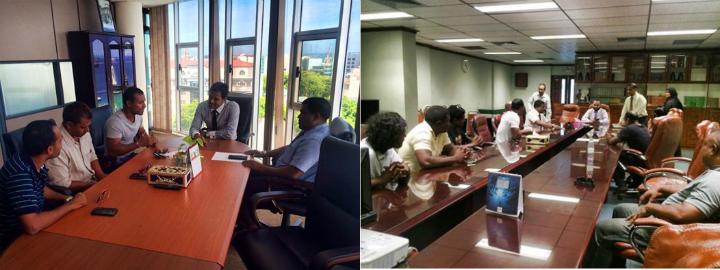In July 2009, blogger Hilath Rasheed broke news of an underage girl being kept as a concubine on his blog. Soon afterwards, he started receiving death threats online.
He was accused of being an infidel and anonymous commenters sent him messages warning him against walking in dark alleyways. They threatened to slash his throat and behead him.
Two years later, in June 2012, three men ambushed Hilath in a dark alleyway leading up to his apartment block, slashed his throat and left him for dead.
Recalling the events today, Hilath told Minivan News he had not taken cyber death threats seriously before the fatal attack. He had also suffered an assault in December 2011.
“I was naïve and uninformed that some Maldivian youngsters in gangs could be brainwashed to the extent of decapitating a fellow human in the name of Islam,” he said.
Doctors called Hilath’s recovery a miracle.
Death threats have become a norm in Maldivian cyberspace. Politicians, journalists, bloggers and social media users have reported receiving cyber death threats for a range of reasons, from their support of a particular political party to their advocacy of freedom of religion.
Minivan News has also learned death threats were issued in at least one of this week’s abductions by vigilante mobs prior to the act.
Eyewitnesses alleged gangsters and religious extremists carried out the abductions as part of an effort to identify cyber activists supporting atheism and secularism in the Maldives. The abductees were also accused of homosexuality and atheism and were asked to prove their faith in Islam, sources said.
“With the recent kidnappings of some Maldivians by an Islamist vigilant mob of about 40, on the pretext their victims are ‘laadheenee’ or ‘impious’, I will advise everyone to really be careful about any kinds of threats because now I believe they can turn real all too easily,” Hilath said.
The Human Rights Commission of the Maldives (HRCM) has also expressed concern over the prevalence of cyber threats of violence and urged victims to report threats made via Facebook, Twitter, or comments on blog posts to the Maldives Police Services.
“In light of recent events, at a time of high levels of intolerance, and increase in gang related violence, do not treat any form of cyber threat as an idle threat,” HRCM Vice President Ahmed Tholal said.
However, prominent blogger Yameen Rasheed said he does not trust the police to protect bloggers, especially those who advocate for freedom of religion. He noted the police had failed to take action against individuals who had attacked Hilath in the December 2011 assault, despite photographic evidence.
“There is nothing you can do. I do not believe police will take action. There are some among the police who sympathise with the attackers,” he said.
The opposition Maldivian Democratic Party (MDP) has also alleged that extremist ideologies are prevalent among the security forces.
Yameen, who has also received cyber threats, said his fellow bloggers in the Maldives blogosphere “don’t feel secure at all” in light of the recent abductions.
In a blog post on Tuesday, Yameen has suggested the government backs the individuals behind the abductions. He said he expects more threats for his blog posts, but feels the only precaution he can take is documenting and publicising the incidents.
Whistleblower Aishath Velezinee and Raajje TV journalist Asward Ibrahim Waheed, who both suffered physical violence after receiving death threats online, have also urged victims of cyber harassment to take precautions when threatened online.
Velezinee was stabbed in 2010 for her revelations of judicial corruption while Asward was nearly beaten to death in 2012 after writing reports critical of the government.
Both Velezinee and Asward also expressed low levels of confidence in the security forces’ ability to take action.
“I made public the private messages that had been sent to me. There was no other way but to make the public as aware as possible,” Velezinee said.
Speaking of harassment online, Velezinee said she was the victim of a smear campaign which labeled her as a drug addict and an infidel prior to the attack. “This is systematically done to justify the physical violence,” she said.
“Social media serves as a means of communication with the world. If they can silence social media users, it is a big win for them,” she said.
Asward said he believed the prevalence of death threats to be linked to a culture of accepting violence in the Maldives. In protests across the political spectrum, demonstrators call for people “to be hung, slaughtered, or killed,” he said. “Maldivians do not seem to call for discussion to solve issues.”
A media official at the Maldives Police Services told Minivan News today that cyber crimes are difficult to investigate due to challenges in tracing those who issue threats. A law on cyber crimes is needed to facilitate investigations, the police said.
A former law enforcement official who wished to remain anonymous also raised concerns over lack of legislation on cyber crimes, but said police must make use of their limited capacity to track down perpetrators in order to deter and limit the prevalence of online threats.
Former Deputy Prosecutor General Hussein Shameem has said threats issued on social media can be prosecuted under the Act on Prohibition of Threats and Use of Dangerous Weapons passed in 2010.
The Prosecutor General’s Office has pressed charges against individuals for threats made via phone calls and text messages, but have not yet received cases relating to social media and cyber threats, he said.
Other prominent figures who have eported receiving death threats via text messages and social media include former President Mohamed Nasheed, MDP MP Mariya Ahmed Didi, former Speaker Abdulla Shahid, ruling Progressive Party of the Maldives MP Ahmed Mahloof, and former Election Commission President Fuwad Thowfeek.
 (0)Dislikes
(0)Dislikes (0)
(0)